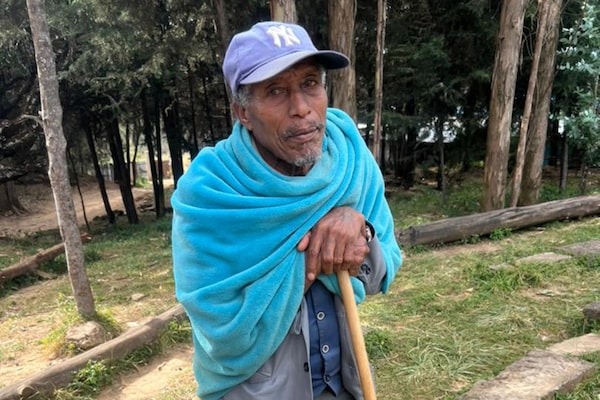
Kibret Getahun, a farmer on the outskirts of Addis Ababa, says he was forced to abandon a large portion of his land, with little compensation, to make room for a massive construction project that will include a palace for Ethiopian Prime Minister Abiy Ahmed.The Globe and Mail
In a country where hunger and war persist, Ethiopian Prime Minister Abiy Ahmed is facing criticism for a multibillion-dollar construction project that would reportedly include a national palace and luxury villas for him and his top officials.
Residents of the site, on a forested hill overlooking the Ethiopian capital Addis Ababa, are already being evicted to make room. Some told The Globe and Mail that they are being forced to give up their ancestral farms without adequate compensation.
Ethiopian journalists and other sources have reported that the project could cost US$10-billion to US$15-billion, at a time when Ethiopia is seeking billions of dollars in foreign loans to rebuild its war-shattered economy. The government has said it needs about US$20-billion in funding for postwar reconstruction, including at least US$2-billion from the International Monetary Fund. It has also received billions of dollars in humanitarian aid from the United Nations and other relief agencies in recent years as conflicts mounted.
An estimated 20 million Ethiopians are in need of emergency food aid, mostly because of wars and drought. While the brutal war in the Tigray region in the north of the country has officially ended, Eritrean troops remain on the ground there, and deadly clashes continue between the Ethiopian army and local militias in the adjacent Amhara region.
The construction work will cover 500 hectares. Known as the Chaka (forest) Project, it will reportedly include three artificial lakes, a luxury hotel, conference halls, a waterfall, a zoo, a cable car and imported palm trees, along with the palace and villas.
Mr. Abiy’s press secretary, Billene Seyoum, would not disclose any estimate of the project’s cost. In response to questions from The Globe, she alleged that the reports on the palace are “crafted to incite international uproar.” She described the Chaka Project as “a grand national project that aims to transform the face of Addis Ababa” and seeks to create “a smart modern city within a larger old and historic one.”
Mr. Abiy has said that the project will be funded by international and domestic donors. His close ally, the United Arab Emirates, is expected to be a key contributor. But the funding is shrouded in secrecy, and parliamentary scrutiny has not been allowed.
Ethiopia’s private sector is indirectly helping to finance the work. One businessman told The Globe that he was heavily pressured by government officials to contribute to a fund for “beautification” of the capital, which could include the palace project. He said he received endless phone calls, threats and warnings that he could be banned from receiving official contracts if he failed to donate. The Globe is not naming the businessman because he fears retribution from the government.
To build the palace project, government workers are bulldozing land, chopping down trees, destroying older homes and evicting hundreds of residents to make room for new roads.
“We lived in this land for over a century and it was passed to us by our ancestors, but all of a sudden I was told I did not have a title deed to my own home and was forced to vacate it with no compensation,” said Alemayehu Tadesse, a 74-year-old farmer whose home is near the palace site.
He was devastated when he realized he was losing his ancestral land. “I have not just lost my home but also my livelihood as a farmer,” he told The Globe.
Another farmer, Kibret Getahun, said he was forced to abandon a large portion of his land, with little compensation. He is now a security guard at a church.
“Our farms have now been replaced with paved roads,” he said. “We are becoming strangers in our own home.”
Bezunesh Taddesse, a 67-year-old widow and retired math teacher, found out about her eviction when her name appeared in an official notice on a church wall last year. There was little warning or time for negotiation, she said.
“I do hope that I will be given some compensation, perhaps a plot of land elsewhere, and won’t be thrown out to take shelter with my adult children, like most people here.”
The Prime Minister’s press secretary said the government and the city are following the laws and regulations on compensation for those who are relocated. “A majority of the land being developed by the Chaka Project is uninhabited,” Ms. Seyoum told The Globe in response to questions.
To discourage protests around the palace site, the government has deployed soldiers along the road to the site; they monitor visitors and check their identification. The military has also built temporary camps where people are detained and questioned. Some residents have reported beatings in the camps.
While dissent inside Ethiopia is tightly curtailed, criticism of the palace project has leaked out, especially on social media and in the Ethiopia diaspora. Yonas Biru, a former senior World Bank official and one-time economic adviser to the Ethiopian government, calls it a “vanity project” that reveals a lack of empathy for the suffering of millions of Ethiopians.
Despite the government’s promise of private funding, it is using public money for building roads and clearing land for the palace, Mr. Biru said in a commentary on the Addis Insight website. The project is contributing to “severe budget shortages” and a costly shortage of foreign exchange, he added.
Ms. Seyoum said the Chaka Project is creating thousands of jobs and helping “unlock Ethiopia’s potential.”
With reporting by a Globe and Mail freelancer in Addis Ababa whose name is withheld from publication for safety reasons.
 Geoffrey York
Geoffrey York